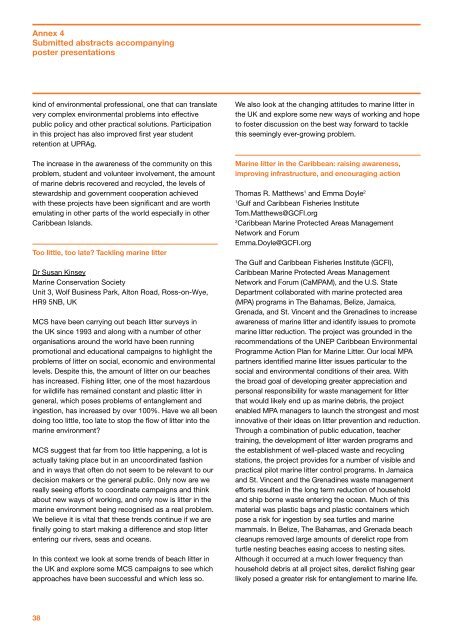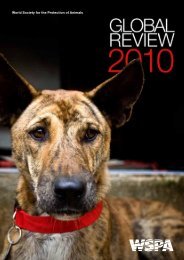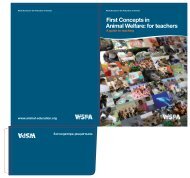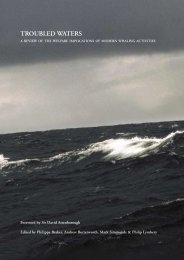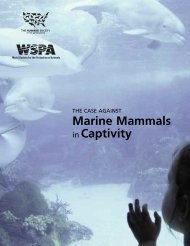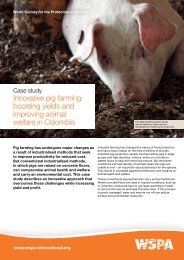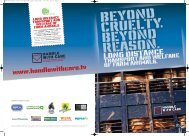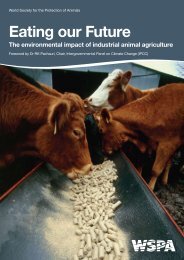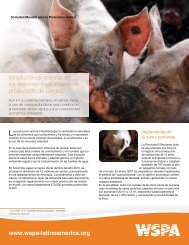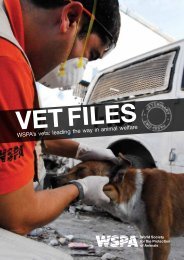Proceedings of the Untangled symposium: - WSPA
Proceedings of the Untangled symposium: - WSPA
Proceedings of the Untangled symposium: - WSPA
You also want an ePaper? Increase the reach of your titles
YUMPU automatically turns print PDFs into web optimized ePapers that Google loves.
Annex 4Submitted abstracts accompanyingposter presentationskind <strong>of</strong> environmental pr<strong>of</strong>essional, one that can translatevery complex environmental problems into effectivepublic policy and o<strong>the</strong>r practical solutions. Participationin this project has also improved first year studentretention at UPRAg.The increase in <strong>the</strong> awareness <strong>of</strong> <strong>the</strong> community on thisproblem, student and volunteer involvement, <strong>the</strong> amount<strong>of</strong> marine debris recovered and recycled, <strong>the</strong> levels <strong>of</strong>stewardship and government cooperation achievedwith <strong>the</strong>se projects have been significant and are wor<strong>the</strong>mulating in o<strong>the</strong>r parts <strong>of</strong> <strong>the</strong> world especially in o<strong>the</strong>rCaribbean Islands.Too little, too late? Tackling marine litterDr Susan KinseyMarine Conservation SocietyUnit 3, Wolf Business Park, Alton Road, Ross-on-Wye,HR9 5NB, UKMCS have been carrying out beach litter surveys in<strong>the</strong> UK since 1993 and along with a number <strong>of</strong> o<strong>the</strong>rorganisations around <strong>the</strong> world have been runningpromotional and educational campaigns to highlight <strong>the</strong>problems <strong>of</strong> litter on social, economic and environmentallevels. Despite this, <strong>the</strong> amount <strong>of</strong> litter on our beacheshas increased. Fishing litter, one <strong>of</strong> <strong>the</strong> most hazardousfor wildlife has remained constant and plastic litter ingeneral, which poses problems <strong>of</strong> entanglement andingestion, has increased by over 100%. Have we all beendoing too little, too late to stop <strong>the</strong> flow <strong>of</strong> litter into <strong>the</strong>marine environment?MCS suggest that far from too little happening, a lot isactually taking place but in an uncoordinated fashionand in ways that <strong>of</strong>ten do not seem to be relevant to ourdecision makers or <strong>the</strong> general public. 0nly now are wereally seeing efforts to coordinate campaigns and thinkabout new ways <strong>of</strong> working, and only now is litter in <strong>the</strong>marine environment being recognised as a real problem.We believe it is vital that <strong>the</strong>se trends continue if we arefinally going to start making a difference and stop litterentering our rivers, seas and oceans.In this context we look at some trends <strong>of</strong> beach litter in<strong>the</strong> UK and explore some MCS campaigns to see whichapproaches have been successful and which less so.We also look at <strong>the</strong> changing attitudes to marine litter in<strong>the</strong> UK and explore some new ways <strong>of</strong> working and hopeto foster discussion on <strong>the</strong> best way forward to tacklethis seemingly ever-growing problem.Marine litter in <strong>the</strong> Caribbean: raising awareness,improving infrastructure, and encouraging actionThomas R. Mat<strong>the</strong>ws 1 and Emma Doyle 21Gulf and Caribbean Fisheries InstituteTom.Mat<strong>the</strong>ws@GCFI.org2Caribbean Marine Protected Areas ManagementNetwork and ForumEmma.Doyle@GCFI.orgThe Gulf and Caribbean Fisheries Institute (GCFI),Caribbean Marine Protected Areas ManagementNetwork and Forum (CaMPAM), and <strong>the</strong> U.S. StateDepartment collaborated with marine protected area(MPA) programs in The Bahamas, Belize, Jamaica,Grenada, and St. Vincent and <strong>the</strong> Grenadines to increaseawareness <strong>of</strong> marine litter and identify issues to promotemarine litter reduction. The project was grounded in <strong>the</strong>recommendations <strong>of</strong> <strong>the</strong> UNEP Caribbean EnvironmentalProgramme Action Plan for Marine Litter. Our local MPApartners identified marine litter issues particular to <strong>the</strong>social and environmental conditions <strong>of</strong> <strong>the</strong>ir area. With<strong>the</strong> broad goal <strong>of</strong> developing greater appreciation andpersonal responsibility for waste management for litterthat would likely end up as marine debris, <strong>the</strong> projectenabled MPA managers to launch <strong>the</strong> strongest and mostinnovative <strong>of</strong> <strong>the</strong>ir ideas on litter prevention and reduction.Through a combination <strong>of</strong> public education, teachertraining, <strong>the</strong> development <strong>of</strong> litter warden programs and<strong>the</strong> establishment <strong>of</strong> well-placed waste and recyclingstations, <strong>the</strong> project provides for a number <strong>of</strong> visible andpractical pilot marine litter control programs. In Jamaicaand St. Vincent and <strong>the</strong> Grenadines waste managementefforts resulted in <strong>the</strong> long term reduction <strong>of</strong> householdand ship borne waste entering <strong>the</strong> ocean. Much <strong>of</strong> thismaterial was plastic bags and plastic containers whichpose a risk for ingestion by sea turtles and marinemammals. In Belize, The Bahamas, and Grenada beachcleanups removed large amounts <strong>of</strong> derelict rope fromturtle nesting beaches easing access to nesting sites.Although it occurred at a much lower frequency thanhousehold debris at all project sites, derelict fishing gearlikely posed a greater risk for entanglement to marine life.38


